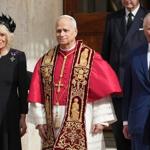MANCHESTER, England (AP) — Against the geopolitical backdrop of Russia’s invasion of Ukraine in early 2022, a consortium led by American private equity titans took the opportunity to acquire one of soccer’s crown jewels.
What followed at Chelsea was torrid and, at times, bewildering.
Unprecedented spending. A carousel of coaches. Dramatic on-field collapses and the deployment of financial mechanisms that looked more at home on Wall Street than in sport.
Not to mention ridicule — by the truckload — as the new U.S. owners seemed to make one misstep after another in the unforgiving world of elite soccer.
Then, in July, Chelsea was crowned world champion.
The journey from chaos to the top of the world was as rapid as it was unconventional.
Shaking up soccer
Co-owner Todd Boehly boasted he “knew all along” success would come. He beamed proudly alongside Donald Trump at MetLife Stadium as Chelsea’s players hoisted the Club World Cup.
Also watching was Behdad Eghbali, the Iranian-American billionaire co-founder of Clearlake Capital.
Boehly and Clearlake made their move when Chelsea's Russian former owner Roman Abramovich was sanctioned and forced into a hurried sale as part of the U.K. government’s clampdown on “oligarchs and kleptocrats” with links to the Kremlin.
Some of the new regime's practices have coincided with tightening of the sport's financial rules. Meanwhile, some fans have complained about rising ticket prices and the “Americanizing” of a storied English club.
But, crucially, there has also been success.
“The club have been lucky to some extent because there’s a whole range of stuff over the last few years that supporters could have definitely made a proper protest about,” said Alex Burke of the Chelsea supporters’ group We Are The Shed. “But there's been such fluctuating emotions around the team and the club as a whole, that they kind of just about got away with it.”
Spending power
Chelsea was no stranger to tumult under Abramovich, who bought the club in 2003 and transformed it into a powerhouse. Coaches were hired and fired, while superstar signings became the norm.
Author Nick Purewal said Chelsea's executives saw similar characteristics in Boehly — who has a stake in the Los Angeles Dodgers — and Clearlake when evaluating potential buyers.
“Abramovich was that rare thing of an individual man running a football club on his own ... one person being in total charge,” said Purewal, who wrote ‘Sanctioned: The Inside Story of the Sale of Chelsea FC.’
Boehly and Clearlake, he said, were deemed to have “similar decisive behavior in business ... swift decision-making and swift actions.”
And they had money.
They bought Chelsea for $3.2 billion and spent more than $600 million on transfers in their first season.
But a team that won the Champions League two years prior finished 12th in the Premier League — Chelsea's worst finish in almost two decades.
After a haul of 21 trophies under Abramovich, the new owners looked out of their depth.
Wall Street meets soccer
Opinion, however, is shifting as private equity principles — cost spreading, rapid restructuring and long-term planning — are yielding results.
Last season Chelsea qualified for the lucrative Champions League and won the UEFA Conference League. Then came the Club World Cup and prize money of around $100 million.
Soccer finance expert Kieran Maguire, host of the podcast The Price of Football, said the strategy was “working partially,” but after spending more than $1 billion on transfers, there is a heavy reliance on Champions League qualification.
“The dangers are that if they don’t qualify for the Champions League for a couple of seasons, that’s going put a big dent in the finances,” he said.
Recommended for you
In an age of ever-tightening spending rules, the risks are clear and Chelsea was fined $36.5 million in July for breaching UEFA’s regulations in its 2024 accounts. It was a record single-season fine for a European club.
“They will feel vindicated by some of the recent success, but it does come at a cost. It does still carry health warnings,” said Dan Plumley, associate head at Sheffield Hallam University specializing in team sports finance and governance. “I'm not sure people will be seeing this as a blueprint.”
Financial expertise
If Boehly and Clearlake’s inexperience in soccer showed early on, their expertise in finance was also evident.
Players were signed to unusually long contracts of up to eight-and-a-half years, meaning their fees could be spread over the length of the deals — an accounting instrument known as amortization. Some regarded it as innovative; others as gaming the system. Both UEFA and the Premier League have since limited amortization to five years.
Another financial boost came with the sale of club-owned hotels and its women’s team to subsidiaries of its parent company — seen by some as another loophole exploited.
Trusting data
Chelsea is still spending heavily — but smarter. At the heart of the regime is a faith in numbers. Vast investments into data and scouting are driving decision-making.
The priority is signing younger players to long, incentivized contracts — like 18-year-old Brazil forward Estevao. Chelsea had the Premier League's youngest squad last season.
The strategy, Maguire said, is high risk but potentially high return — providing two chances to optimize investment.
“A: they’re successful on the pitch and that generates extra revenues,” he said. “Or B: they sell the players, and because they’re on long contracts, there’s no discount on the price and they preserve full market value.”
Managerial merry-go-round
Lessons have been learned over Chelsea's handling of coaches after Thomas Tuchel, Graham Potter and Mauricio Pochettino were given only brief reigns.
Current Chelsea manager Enzo Maresca was a bold hire given his general inexperience. He won two trophies last season and returned the club to the Champions League.
His style of possession-based soccer is what Chelsea wants at all age levels of the club.
Yet the club's structure is being built to avoid relying too much on one person — taking the business approach of “What happens if you get hit by a bus tomorrow?”
For instance, there are two sporting directors when many clubs have just one.
Keeping fans onside
The introduction of an in-stadium DJ last season was one too many for some fans.
A bigger issue is ticket prices, which have been raised for two years running.
In soccer, however, success tends to cure most ills.
Some fans considered a ticket-price protest ahead of the new campaign. But, as Burke said: “It got to the first game of the season and, being champions of the world, we wanted to celebrate that first and foremost.”
James Robson is at https://twitter.com/jamesalanrobson
AP soccer: https://apnews.com/hub/soccer




























(0) comments
Welcome to the discussion.
Log In
Keep the discussion civilized. Absolutely NO personal attacks or insults directed toward writers, nor others who make comments.
Keep it clean. Please avoid obscene, vulgar, lewd, racist or sexually-oriented language.
Don't threaten. Threats of harming another person will not be tolerated.
Be truthful. Don't knowingly lie about anyone or anything.
Be proactive. Use the 'Report' link on each comment to let us know of abusive posts.
PLEASE TURN OFF YOUR CAPS LOCK.
Anyone violating these rules will be issued a warning. After the warning, comment privileges can be revoked.